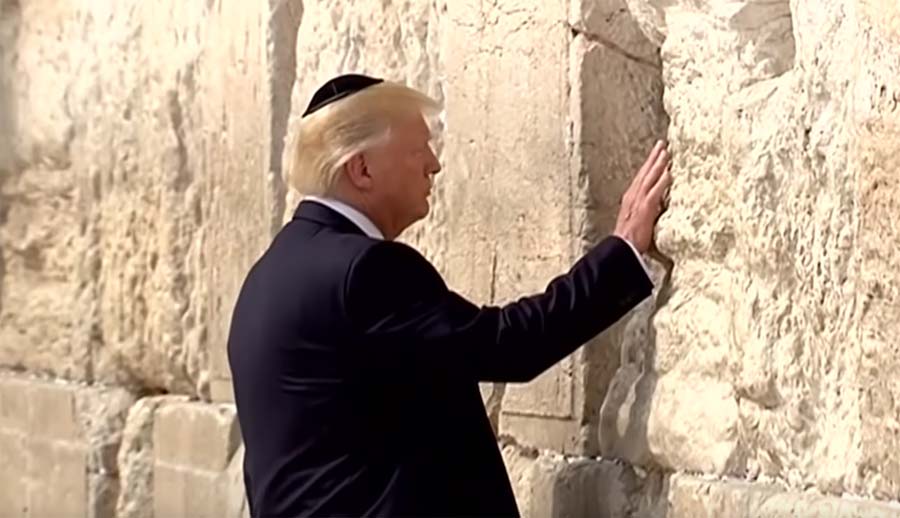
NEW YORK - President Donald Trump is "actively considering" how to follow through on his pledge to move the U.S. Embassy in Israel to Jerusalem, Vice President Mike Pence said Tuesday, reopening a divisive question that puts the president at odds with military and diplomatic advisers and close allies.
Pence drew whoops and applause at an event marking 70 years since the United Nations vote that led to creation of the state of Israel when he contrasted the Trump administration stance on the embassy to that of past U.S. administrations.
"While for the past 20 years, Congress and successive administrations have expressed a willingness to move our embassy, as we speak, President Donald Trump is actively considering when and how to move the American Embassy in Israel from Tel Aviv to Jerusalem," Pence said.
Congress mandated in 1995 that the embassy be relocated from Tel Aviv, the commercial hub, to disputed Jerusalem. Each president since has deferred the move, citing national security risks. Trump did the same in June, setting aside a campaign promise to immediately order the relocation. He acted, reluctantly, on advice from Cabinet heads, Jordanian King Abdullah II and others who argued the move could ignite violence among Palestinians and their supporters who claim part of Jerusalem as a future capital.
At the time, the White House said a move could jeopardize nascent administration efforts to restart Mideast peace talks.
Trump faces another deadline on Friday to say what he will do about the embassy, and Pence's remark suggests Trump may move ahead with a relocation plan. Pence did not mention the upcoming deadline, which comes about two weeks before he will visit Israel and deliver an address to the Knesset. Trump visited Israel in May.
The commemoration placed Pence before an enthusiastic crowd that included Trump backer Ronald Lauder and other prominent conservative Jewish New Yorkers. Lauder reminded the crowd that he has known Trump, a native New Yorker, for decades.
The event's backstory, however, is a reminder of the overwhelmingly liberal and raucously tribal political climate of New York City. The Queens Museum, site of the 1947 vote, had agreed to hold the commemoration in June but balked in August in a confusing episode that included accusations of anti-Semitism against the museum and its director.
The museum reversed the cancellation after reviewing whether it met the tax-exempt institution's guidelines. Queens lawmakers, however, have continued to criticize museum director Laura Raicovich. Two have called for her removal.
"We are deeply committed to all the communities we serve through our meaningful arts programming and we are looking forward to making this a successful event," the museum's Board of Trustees chairman Mark Coleman said in a statement in August.
The museum closed on the day of the Trump-Pence inauguration in solidarity with an "artist strike" against what organizers called the intolerance of the incoming Republican administration. Raicovich has tweeted criticism of Trump's policies on immigration and other issues. She was not part of the program Tuesday, and there was no mention of the event on the museum's "events" Web page.
Pence said nothing about that controversy, but noted to applause that the United States has taken a tougher line in support of Israel at the United Nations. "The days of Israel-bashing at the United Nations are over," he said, echoing a line that U.N. Ambassador Nikki Haley uses frequently.
The world body has too often countenanced "anti-Semitism and hatred," Pence charged.
The U.S. ambassador to Israel, former Trump bankruptcy lawyer David Friedman, also recently reiterated the administration's commitment to moving the U.S. embassy, telling a pro-Israel audience here earlier this month that the move "is not a question of if, it is a question of when."
As a candidate, Trump had vowed to treat Israel with greater respect than he claimed Barack Obama had done. Trump said one example of his new approach would be to finally override concerns about the embassy move that he cast as overly cautious.
"No one should consider this step to be in any way a retreat from the President's strong support for Israel and for the United States-Israel alliance," a White House statement about the June 1 deferral said.
The embassy, along with those of many other nations, was built in Tel Aviv as a signal that the United States was not taking a position on the future status of Jerusalem. Although the United States considers Jerusalem the Israeli capital, its official position for decades has been that the Israeli occupation of East Jerusalem is illegitimate and that the city's status should be resolved through negotiations.
In his address Tuesday, Pence said the United States is committed to a peace settlement, but made no mention of where that long-deferred goal stands now. The effort has been led by Trump son-in-law and adviser Jared Kushner, and special adviser Jason D. Greenblatt.
As president, Trump has softened U.S. language dealing with Israeli settlements in the West Bank, but also asked Israel to refrain from large building operations to improve the climate for peace talks.


 Contact The Editor
Contact The Editor
 Articles By This Author
Articles By This Author